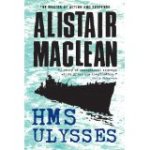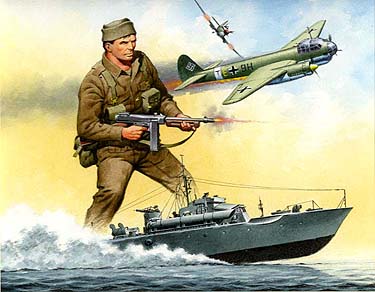And Through Me Tell the Story
October 20, 2013 § Leave a comment
 HMS Ulysses (Maclean, Alistair)
HMS Ulysses (Maclean, Alistair)
This, then, was war in the northern seas. No death and glory heroics, no roaring guns and spitting Oerlikons, no exaltation of the spirit, no glorious defiance of the enemy: just worn-out sleepless men, numbed with cold and sodden duffels, grey and drawn and stumbling on their feet with weakness and hunger and lack of rest, carrying with them the memories, the tensions, the cumulative physical exhaustion of a hundred such endless nights…
The Family Book Swap event (for details, see here and here) was meant for my son, my wife and me to develop an appreciation for the reading tastes and opinions of the other two, to broaden our outlook, to step outside our reading comfort zone. In that sense, being given Alistair Maclean’s HMS Ulysses by my son was a bit of a con job. Maclean is no stranger to me – much of my teenage years was devoted to a World War obsession that saw me work my way through piles of Commando Comics and much of Maclean’s output. Of course I read his spy novels too, but it was at war that Maclean excelled. And war meant completely different and exciting things to my silly teenaged self than it does now to me now.

Is War Cool? Not according to Maclean’s HMS Ulysses. Yes, according to Maclean’s other books. (Commando comic art, courtesy culture24.org.uk)
For this I blame Maclean. It was later that I read Vonnegut’s Slaughterhouse Five, or Heller’s Catch 22; it is hard to believe that they were writing about, and had fought in, the same war as Maclean. In The Guns of Navarone, Force Ten from Navarone, South By Java Head, or Where Eagles Dare, Maclean painted World War II in black and white terms. People on the Allied side were really good people, except when they were traitors, and then they were very bad indeed. The Germans and Japanese were cruel and ruthless. Maclean evoked emotions that were unmixed, pure and atomic: courage, fear, anger, pity, patriotism, friendship. He sang of hard, taciturn men, who showed no emotion, and little concern for their lives. It was Humphrey Bogart in Casablanca minus Ingrid Bergman. Maclean had no patience with female characters: he was a man’s man, who wrote of manly men and masculine virtues, and presumably for young male readers. His works, like Horace’s or Homer’s, were paeans to the cathartic glories of war, celebrating the nobility, the dulce and the decorum of pro patria mori-ing.
HMS Ulysses was Alistair Maclean’s first novel. A painstaking attention to detail is evident throughout the book, more so than in his later ones. Maclean is clearly well acquainted with the turrets, the bridge, the engine and boiler rooms and the decks, in short, with every part of a Dido-class cruiser, from bow to stern; and with life as a seaman on one on the Arctic convoys. It was not surprising to discover, from his Wikipedia entry, that HMS Ulysses was based on Maclean’s own experiences aboard the HMS Royalist in 1943. But that is not all that sets the novel apart from his others.
As the name suggests, HMS Ulysses is still Homeric, but unlike the rest of Maclean’s books, it is more the Odyssey than the Iliad. Ulysses set out for Ithaca with a dozen ships and lost all of them; the Dido class light cruiser HMS Ulysses sets out for Murmansk at the head of a convoy of 32 ships; only five reach their destination. Ulysses had to contend with sirens and monsters, whirlpools and sorceresses; his fleet was decimated by the Lestrygonians, by Polyphemus and Scylla, and finally by Poseidon. His 20th century namesake dealt with U-boats and cruisers, torpedoes and glider bombs, Condors and Stuka dive-bombers, but above all, with extreme cold and fatigue. Remarkably for a Maclean book, we do not come face to face with a single enemy fighter throughout the book – the Germans are as impersonal and anonymous as the forces of nature that the HMS Ulysses is up against.
As in Homer’s Ulysses, the main struggle is between puny man and the endlessly powerful ocean, be it the wine-dark Aegean variety or the bleak and turgid, grey-green waters of the northern seas. The emotions Maclean conveys in this book are different from the ones he usually channels. Here, it is all about exhaustion, dull hopelessness, a creeping dread of drowning in icy waters, even the sensation of churning seasickness caused by a ship plowing through mountainous waves and troughs during a raging storm.
The men on the Ulysses are not driven by motives of patriotism or hatred of the enemy; theirs is an introspective heroism, and they confront the limits of their own physical and mental endurance as much as they do the heaving, turbulent seas outside. The German torpedoes and bombs are almost irrelevant, even up to the point where they smash the ship and send it into the icy depths.
Like any other great war book, HMS Ulysses is not a glamorizing advertisement for war but a sober depiction of its horrors. It should be prescribed pre-requisite reading before one takes up any other Maclean. Maclean was never as dark as this, ever again. But as I know now – as we know now – war is dark. It usually doesn’t end well for the men and women involved. Often, their heroic sacrifices are futile and meaningless, and human life is wantonly spilled by both sides in the name of a patriotism that is loudly asserted in the cozy chambers where the wars are plotted, but rarely felt under the extreme conditions endured by the people entrusted with the actually fighting. And the men of the HMS Ulysses know this very well, as soldiers and sailors have through history, from the time of Ulysses.
So sing in me, O Muse, and repeat Homer’s description of his hero that could describe the brave men on board the HMS Ulysses, and countless other sailors besides:
“…He saw the townlands
and learned the minds of many distant men,
and weathered many bitter nights and days
in his deep heart at sea, while he fought only
to save his life, to bring his shipmates home…”
Leave a comment